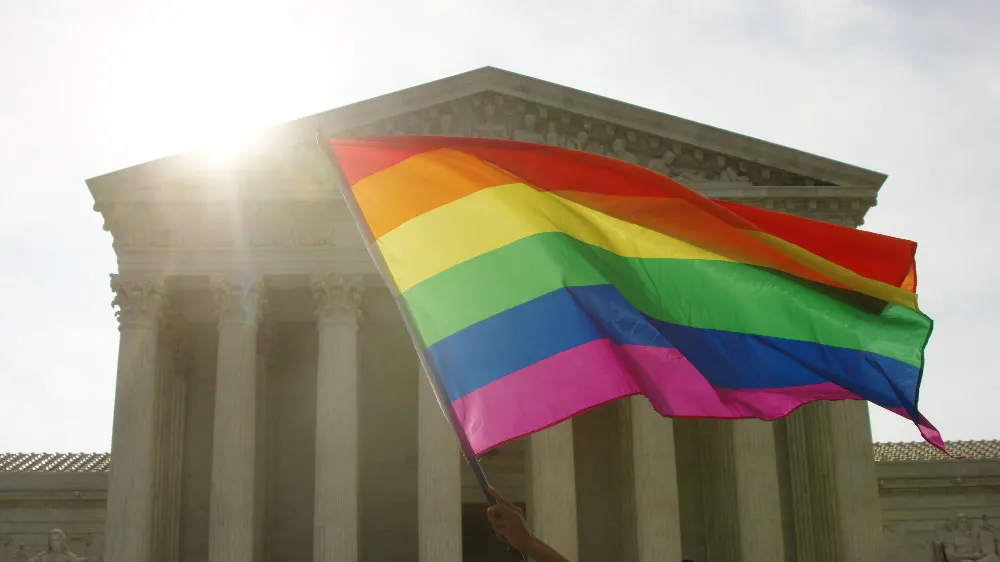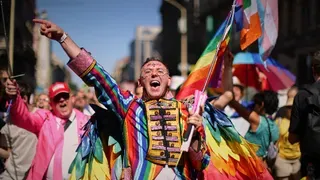September 12, 2015
Gay Journalists' Confab Features Trans Elders
Liz Highleyman READ TIME: 3 MIN.
A panel of trans elders - Miss Major Griffin-Gracy, Veronika Fimbres, and Jamison Green - discussed historical and contemporary issues facing the transgender community during a luncheon plenary at the recent National Lesbian and Gay Journalists Association's national convention and LGBT Media Summit.
The association marked its 25th anniversary at the convention, which ran September 3-6 at the Westin St. Francis.
Misgendering by the media has been a persistent concern for the trans community, though the LGBT press and even the mainstream media have begun to do a better job in recent years, the panelists agreed.
"Misgendering trans people is akin to bullying LGB people," said moderator Ashley Love, a transgender media advocate.
"The best way to find out who somebody is, if they're still living, is to ask them," emphasized Fimbres, the first openly trans person appointed a commissioner when she served on the San Francisco Veterans Affairs Commission from 1997 to 2012.
Once someone has died, however, they may be misgendered by their families, which can influence the media's coverage.
"Trans women are buried in a three-piece suit and a fedora," said Griffin-Gracy, who until recently was the executive director of the Transgender, Gender Variant, Intersex Justice Project. "They take a person who calls themself 'Gladys' and bury them as 'Bob.'"
Asked for advice to the media, Green said, "Acknowledge people's gender identity and speak out when you are confronted by misgendering by others - interrupt it."
Bathroom use remains a major issue facing trans people of all ages, including students. While an increasing number of venues are establishing gender-neutral restrooms, there are legal battles across the country involving trans people using the restroom of their preferred gender.
"There is concern that men in dresses will harass women in bathrooms, but trans people have never caused an incident in a restroom themselves - incidents are caused by others not perceiving them as the right gender," said Green, who pointed out that this issue also affects non-trans people who happen to be masculine women or feminine men.
The panel also discussed trans women in prison, where they are often endangered by being housed with men.
"The prison system is set up to judge you by your gonads," said Fimbres, who has advocated for trans people in San Francisco jails. "If you've had any work done, they isolate you for your own safety - you wouldn't put your dog in a cage like that."
Fimbres praised San Francisco Sheriff Ross Mirkarimi's plan - finalized last week - to stop classifying transgender inmates according to their sex assignment at birth and to house them based on their self-identification, calling it a "landmark."
Trans people live in a "third-world country" in the midst of the U.S., said Green.
"We do not have what other people have - we do not have same rights, the same social freedoms, the same ability to get health care, and the same sense of being OK when we walk down the streets," he said.
Trans People in the Media
The discussion inevitably turned to Caitlyn Jenner and who should represent trans people in the media. Two other famous trans women, actress Laverne Cox and author Janet Mock, both received praise for their inclusiveness.
"People have suggested that now that we have trans celebrities, maybe the laws will change," Green said. But in reality, "we have celebrities now because trans people have been working to change the laws for 40 years."
Finally, discussion turned to the forthcoming film Stonewall , by gay director Roland Emmerich, which puts a cisgender young white gay man in a leading role.
Some trans people and their advocates have criticized the film based on its trailer, saying it minimizes the importance of trans women and people of color as the key agents sparking the famous riots.
"Stonewall was not started by a gay white man, it was started by a trans woman," according to Fimbres. "Compton's Cafeteria happened before Stonewall, but it doesn't get the same attention."
She was referring to the August 1966 riot at a San Francisco cafeteria that was led by trans people who were tired of police harassment and preceded Stonewall by three years.
"We're trying to make sure our history is told correctly," said Griffin-Gracy, herself a Stonewall veteran. "White people were around - they have a tendency to incorporate themselves everywhere - but we were perfectly able to take care of ourselves. We need to let the younger population of [trans] kids know that they do have a history."




